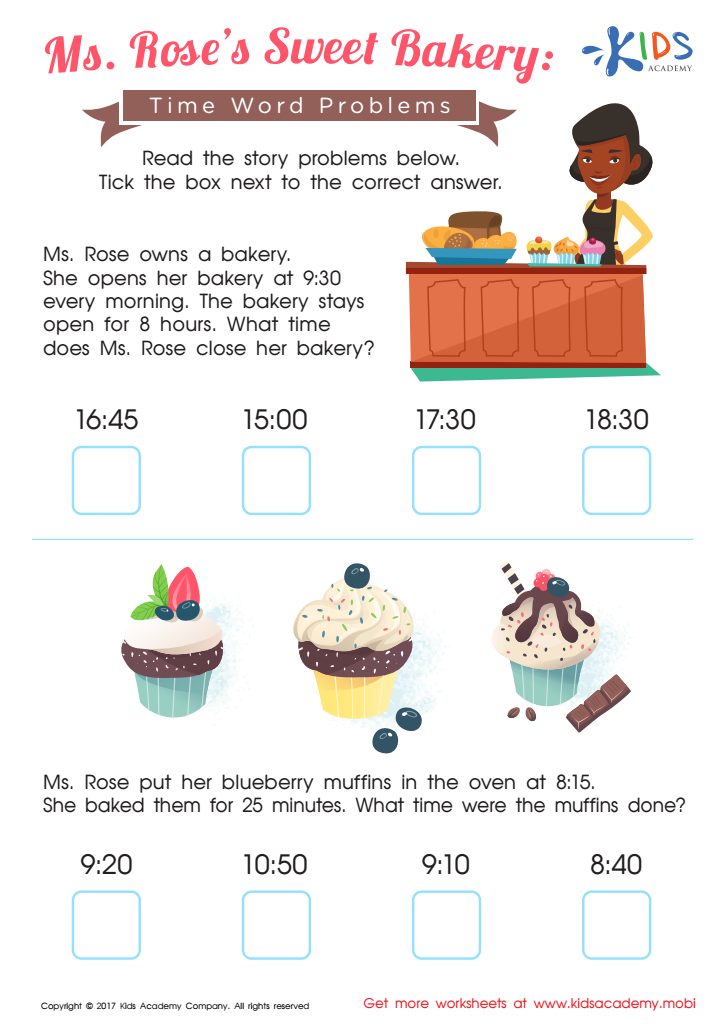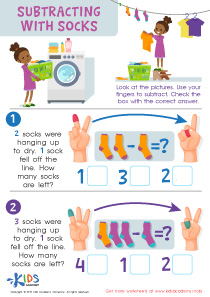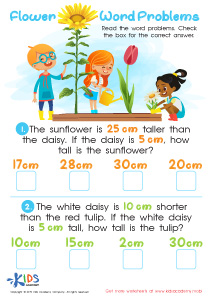Time Word Problems Worksheets for Ages 3-4
1 filtered results
-
From - To
Introducing our Time Word Problems worksheets, expertly crafted for young learners aged 3-4 years. These engaging school downloadable worksheets are designed to introduce the concept of time in a fun and interactive way. Each worksheet combines clear, age-appropriate problems with vibrant illustrations to maintain your child's interest. Ideal for both classroom and home use, they aim to build foundational time-telling skills through playful challenges. Start your child's educational journey with confidence by incorporating these worksheets into their learning routine. Perfect for early learners eager to grasp the basics of hours and minutes!


Ms. Roseв's Sweet Bakery Time Worksheet
Understanding Time Through Worksheets: The Value of Time Word Problems for Young Learners
In the early stages of childhood education, grasping the concept of time is as crucial as learning the alphabet or numbers. For children aged 3-4 years, school homework sheets focusing on time word problems play a pivotal role in building a foundational understanding of how time works in daily life. These worksheets are not just educational tools; they are stepping stones that help young minds decode the complexities of hours, minutes, and daily routines.
Why Focus on Time Word Problems?
Time word problems are essential because they blend practical life skills with academic learning. At the age of 3-4, children are just beginning to notice the routine around them—when it's time to wake up, have meals, or go to bed. Worksheets that pose simple questions related to these daily events encourage children to connect learning with real-life scenarios, making the abstract concept of time more concrete and understandable.
Development of Cognitive Skills
School homework sheets that include time word problems are excellent for cognitive development. These activities require children to listen, understand, and process information before responding. This enhances their comprehension abilities and problem-solving skills. By figuring out simple problems like, "If lunch is at 12:00 and naptime is after 2 hours, what time do we go to sleep?" children learn to calculate and use time-related vocabulary effectively.
Building Mathematical Foundations
Although advanced mathematical concepts are not suitable for preschoolers, early exposure to numbers through time is beneficial. Time word problems on school homework sheets help children recognize numbers, understand sequences, and start basic arithmetic by calculating small time intervals. This gentle introduction to math through practical examples lays a strong foundation for more complex mathematical learning in later years.
Enhancing Language Skills
Discussing time involves a specific set of vocabulary—words like before, after, morning, night, hours, and minutes. Exposure to time word problems increases a child’s vocabulary and improves their language skills. As they describe and engage with the problems presented in the worksheets, they learn new words and how to use them in context, boosting both their verbal and written communication skills.
Encouraging Routine and Responsibility
School homework sheets with time word problems also help instill a sense of routine and responsibility in young children. By regularly completing these worksheets, they begin to understand the importance of time management and scheduling. They start to appreciate why certain tasks are done at specific times, which is a crucial life lesson that will serve them well throughout their lives.
Interactive and Engaging Learning
Children in the age group of 3-4 years learn best through play and interaction. Time word problems in school homework sheets can be designed in a visually appealing and engaging manner, often incorporating colorful images, clocks, and familiar daily scenarios. This makes learning a fun activity rather than a chore. Parents and educators can further enhance engagement by role-playing different time-based scenarios, which helps deepen the child's understanding and retention of the concept.
Preparation for Future Academic Challenges
While the immediate benefits of learning about time are clear, there are long-term academic advantages as well. As children grow, they encounter more complex subjects where time management becomes increasingly important. Early familiarity with time helps them handle activities like timing for tests, managing school projects, and planning their study time effectively. Starting early with time word problems prepares children not just academically, but also instills soft skills like punctuality and respect for others' time.
Conclusion
In conclusion, school homework sheets with time word problems are a fundamental tool in the educational journey of young children. They provide a multifaceted approach to learning that combines cognitive development, mathematical foundations, language skills, and life lessons in a comprehensive package. These worksheets prepare children not only for their future academic years but also equip them with practical skills that are crucial in everyday life. For parents and educators, investing time in teaching young children about time through these worksheets is a worthwhile endeavor that promises to yield significant benefits for the learner's future.

 Assign to the classroom
Assign to the classroom











